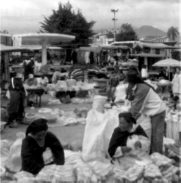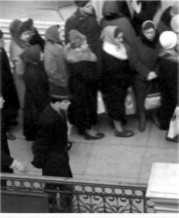ВУЗ: Не указан
Категория: Не указан
Дисциплина: Не указана
Добавлен: 18.10.2024
Просмотров: 230
Скачиваний: 1
Now read the text again and answer these questions in your own words in the space provided below.
Who controls a market economy?
Who decides what products are for sale in a free market?
What do companies want?
Why is competition a good thing?
Why does technology exist in the market economy?
Hit
* an Ca.lf * i- mor ■ ■, Unn 3 17
Notes:
Before you listen
Discuss these questions with your partner.
Do you think the free market is a good idea?
Is it good for society? Why / Why not?
! F Listening 4)))
Now listen and choose the correct answer.
Adam Smith's invisible handtheory:
People tire naturally selfish / helpful.
The free market only demands what is good for society / producers.
When people work for their own good, they do good for consumers / societyalso.
lit the real economy:
In the free market there is a demand for goods which are not expensive / necessary.
There is also demand for goods which are good / badfor us.
The market / Advertisingcan create demands that do not normally exist.
Discuss these questions with your partner.
Why do you think the traditional economy has almost disappeared?
Would you hke to live in a traditional economy? Why/Why not?
Task
You are the leader of a scientific expedition to the forests of Central Africa. You spend six months living with the Mbuti. Give a short presentation about your expedition. Use the space below to make your notes.
Talk about:
why you went
why the Mbuti are important people to study
ЙР
G Speaking
Write an essay comparing the traditional economy with the market economy. Discuss the advantages and disadvantages of each economy. Decide which is best in your opinion.
Remember, you should organise your ideas logically.
These phrases will help you: firstly, secondly, furthermore, however, on the other hand
Discursive essay
PARAGRAPH 1
Introduce the subject by saying what a traditional economy is. and what a market economy is.
PARAGRAPH 2
Say what the advantages and disadvantages of the traditional economy are-
PARAGRAPH 3
Say vrhat the advantages and disadvantages oi the market economy are.
PARAGRAPH 4
Conclude by saying what you think the best system is.
H
Writing

Pronunciation guide
Surplus ч :pbs Incentive insenm Deafening '<k-lnnj Competitor отix-iit.^i >
18 MatiniM»* Cutdt (в Eteaoairi Unit 3
1 ration show
solution very quickly
hoard money paid regularly for work
done
operate answer to a problem
wages , a system which tells us that

Before you read
Discuss the following with your partner.
You learnt about the free market economy in the last unit.
Can you think of any disadvantages it may have?
With your partner, see rf you can think of any ideas for these points:
advertising
-» prices
-» junk food
f A Vocabulary
Match the words and phrases with the definitions.
Й Reading 1
The planned economy
In many ways, the pUttnud иччичпуis the direct opposite of the market economy In the market economy, the forces of supply and demand decide everything: what isproduced, how muchisproduced, the methods of production and the price. In the planned economy, all of this is decided bv the government. In every way that the market economy is/rn . the planned economy is oonfrolled.
rnlortunatelv, no economic system is perfect. If there was a perfect system, economists wouldn t have anything to argue alxait! Market
nllai
C, uэ • |A Itnioaifi Uait 4
19
commodity
standard
socialist
■dustry
S
el indicate
warning
system
shortage
rapidly
when
the government sets a limit on how much people can buy of something
I
when there
isnot enough of
something
a
strong metal made from iron
something
you can buy or sell
what
is usual or typical
all
the businesses and companies involved in the production of heavy
goods, food, technology, etc
describes
someone / something aiming to share wealth equally
H
secretly storing and hiding goods for use later
work
economieshave their strengths. 1 >in theyhave I hoi r problems, too. Planned economies try to provide solutions to these problems. For example, tin tree market supplies tin things that people want. However, what people want and what they need are not always the same Fast food is always in demand, but it's bad for us. In a planned economy, the government could decide to stop fast foodrestaurants operating in the market.
Л second problem with flee markets is that producers alway s want the highest price. ' )tten tin poor can't afford things In a planned economy, the government setsprices Theymake sure that everyone can afford basic commodities. This is one way that planned economies try to share things equally. Another is to control lmw much people gel paid
In a planned economy, workers wages depend on the service they provide to society. If people can hvt without theii service, you get paid less This is very different from the free market. In the free market, someones salary mostly depends on the demand for his or her work. If people like w hat you do. you get paid more.
before l')oo. there were few examples of planned economies. During the 2<>th century, however, tlu planned economy became the standard for s«4'iahst governments like tin I'SSR and China These countries experienced ama/ing economic growth in a very short time. In a market economy, it takes a long time for big industries to grow from small companies. In a planned economy, however, huge industries can grow overnight.
Thi' government simply decides to spend money on factories and factories appear Britain, for example, took centuries to develop her steel industrv in a 11ее market economy, t.hina dev eloped hers in a few decades.
20
и»г i »n <r. . б ■ to i • r>orn(i и • i *. *
When shortages happen, governments can do two things ration goods or raise juices In this situation, people then start to hoard tilings, and the problem gets even worse As the population yets bigger, shortages like this become more common For this reason. China - once the world's biggest planned economy - is rapidly moving towards another system: the mixedeeonomv.
Now read the text again and decide whether these statements are true or false.
In a planned economy, the government decides how products are made.
In a planned economy, suppliers can sell anything that is in demand.
In a planned economy, a doctor should get paid more than a footballer.
Planned economies grow more slowly than market economies.
In a market economy, greater demand for something makes it cheaper.
Planned economies are difficult to run in countries with large populations.
Before you listen
Discuss this question with your partner.
What everyday problems do you think people face in a planned economy?
BP С Listening Ц)))
Rita lives in a country with a planned economy. Listen to her talk about her life and the problems she faces.Tick the problems she mentions in the list below.Then listen again and check your answers.
Before you read 13
What does economics study? 17
What are 18
microeconomics and macroeconomics ? 18
Before you listen 20
Before you read 22
History of economic thought 23
Before you listen 26
Before you read 27
Econometrics 28
Before you listen 29
Before you read 33
The law of demand 34
Before you listen 35
Unit 40
Before you read 40
The traditional economy 40
Before you listen 41
Before you read 43
The market economy 43
Before you listen 44
The planned economy 46
Before you listen 51
Before you read 56
Before you listen 59
Revision Vocabulary Units 1 to 4 61
Before you read 63
Consumer choices 65
Before you listen 75
Before you read 77
Costs and supply 77
Before you listen 78
Unit 80
Before you read 80
Market structure and competition 80
Before you listen 81
Before you read 82
Monopolies 82
Unit 87
Before you read 87
The labour market 87
Before you listen 88
Before you read 89
Supply of labour 89
Before you listen 91
44Unit 93
45Before you read 93
70Factors of production 93
85Before you listen 95
Before you read 96
Division of labour 96
Before you listen 97
Revision Vocabulary Units 5 to 8 100
Before you read 100
Surplus 101
Before you listen 102
Before you read 104
Price discrimination 104
Before you listen 105
Welfare economics 107
Before you listen 108
Before you read 109
Government revenue and spending 109
Before you listen 110
Before you read 112
Wealth, income and inequality 113
Before you listen 115
Before you read 116
Poverty 117
Before you listen 121
Macroeconomics 124
Before you listen 125
Before you read 126
ф D Vocabulary 126
Aggregate demand and aggregate supply 126
BP E Comprehension 128
Before you listen 128
0 F Listening *))) 128
ff G Speaking 129
Task 129
Revision Vocabulary Units 9 to 12 131
Unit 132
Before you read 132
Money 132
^ В Comprehension 133
Before you listen 133
В с Listening Ц))) 133
Before you read 133
0 D Vocabulary 134
Banks 146
В E Comprehension 147
Before you listen 147
F Listening Ц))) 147
G Speaking 148
Unit 149
Before you read 149
ff A Vocabulary 149
Fiscal policy 149
P В Comprehension 150
Before you listen 150
С Listening 4))) 150
Before you read 151
0 D Vocabulary 151
Monetary policy 151
Before you listen 154
rehension 154
Before you read 157
A Vocabulary 157
Interest rates and the money market 157
В Comprehension 158
С Listening H))) 159
Before you read 160
fiJ D Vocabulary 160
Economic shocks 160
Before you listen 163
G Speaking 164
Before you read 165
fif A Vocabulary 165
Inflation 165
Before you listen 167
Before you read 169
ff D Vocabulary 169
Unemployment 169
Before you listen 170
F Listening H))) 170
E Comprehension 170
G Speaking 170
9 H Writing 171
Revision Vocabulary Units 13 to 16 172
Unit 173
Before you read 173
Economic growth 174
9 В Comprehension 176
Before you listen 176
ff С Listening Ц))) 177
Before you read 177
ff D Vocabulary 177
The business cycle 178
fi? E Comprehension 179
Before you listen 179
F Listening И))) 180
H Writing 180
Before you read 181
f A Vocabulary 181
The open economy 181
? В Comprehension 182
Before you listen 183
С Listening 4))) 184
Before you read 184
BP D Vocabulary 184
Exchange rates 185
0 E Comprehension 187
Before you listen 187
F Listening H))) 188
G Speaking 189
Task 189
Before you read 190
A Vocabulary 190
Exchange rate mechanisms 190
й В Comprehension 191
Before you listen 191
0 С Listening 4))) 191
Before you read 192
9 D Vocabulary 192
International trade 192
Before you listen 193
В F Listening 4))) 193
G Speaking 194
Task 194
Unit 195
Before you read 195
В A Vocabulary 195
Less developed countries 196
в В Comprehension 197
Before you listen 197
0 С Listening *))) 197
Before you read 197
В D Vocabulary 197
The Russian economy in the 19th century 198
fij E Comprehension 199
Before you listen 199
F Listening 4))) 199
Task 201
H Writing 201
A Vocabulary 201
в? В Comprehension 203
Before you listen 203
0 С Listening 4))) 203
Before you read 203
ff D Vocabulary 203
Russia's foreign trade 204
9 E Comprehension 205
Before you listen 205
Revision Vocabulary Units 17 to 21 207
Before you read
Discuss the following with your partner.
Can you actually think of any examples of countries with a completely free market or a totally controlled one?
-» Give any examples you can thmk of or say why you can't come up with any true examples.
P D Vocabulary
Complete each sentence with a word or phrase from the box.
agriculture ban efficiently free enterprise manufacturers monopoly private sector profit motivation public transport state sector ■ telecommunications trade
is when businesses are able to
trade without control from the government.
industries belong to and are run by
the government.
industries belong to and are run by
independent businesses.
Buses, trains and planes are examples of
is another word for farming.
produce new goods from
raw materials.
When a business works it runs
successfully without wasting resources.
Telephone and Internet systems are part of the industry
9is what drives businesses in the
market economy.
When the government puts a on
a commodity, people are not allowed to buy or own it.
If only one company controls part of the economy, they have a
12 When companies they do
business with each other.

If Keadinci z
The mixed economy
Most economists would s.iу that there ire n<> examples ill the Worldtoday • >! .< completely ftei market or a completely controlled economy Instead, every country operates a mixture of the two systems Kven in the freest economies, like the USA, there is some government control;even in the strictest planned economy then is sonu free enterprise.
heonomies mix government control and free market values in different ways i hie way is to let privately owned businesses exist alongside state run industries Г he economy К-collies divided between the stale sector and the private sector The state sector often includes industries that till government thinks ire important and rued protection from the risks ot llie frei market This, could include public transport, hospitals, schools and the postal service The state sector can also include large industries that are important for a country' s economic health- such as oil. steel or agriculture. Tiles*, ire sometimes .. ailed primary ituiwitriis because they provide basic materials to manufacturers
4
21
Deregulation means treeing up the economy to allow private businesses to compete with state-run industries. The state sector should then run more efficient!} in order to compete in the free market and because it now has less government protection
Deregulation of services like telecommunications, transport and banking has happened in many countries in recent years People have generally accepted these changes However, generally the public is lesshappy when governments start talking about deregulation in education and health services. Many people feel that profit motivation will harm these services rather than improve them.
Another way in which economies Unlayarc mixed is that governments put limits on free enterprise, l or example, governments may decide to ban trade in certain goodsif they are dangerous They may also create laws to make sure companies trade honestly or to prevent mowijxtlien. If a company has а mono|>oly, normal market forces do not affect it. This is bad for consumers and the economy in general. Governments may also regulate methods of production. They do this to guarantee that products are sale for consumers and ю protect the environment
Many economists would argue that the mixed economy is the best system for consumers. This is because consumers have two ways to control the economy by choosing to buy a company's gornls or services and by choosing to give political parties their votes.


Now read the text again and answer the questions.
What do most economists believe about economies in the world today?
There are a number of hoe markets. Somo countries have a completely planned economy.
A mixed economy exists in some way in all countries.
Why do governments choose to run some industries?
So they can collect taxes. Because they need to be protected from the risks of the free market. To encourage a divided economy. Why do governments deregulate some industries? To make the industries more efficient. To protect them.
Because there is too much competition. According to the text, what is not very popular with the public?
Deregulation of public transport. Deregulation of hospitals and schools. Deregulation of telecommunications and banking What type of state control is notmentioned in paragraph 5?